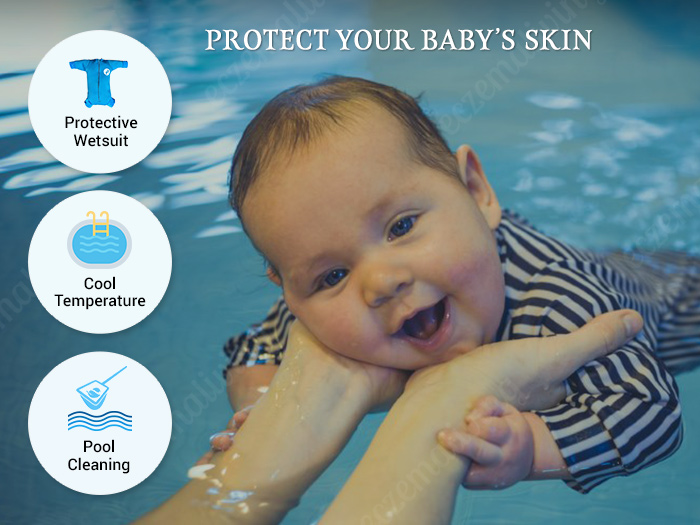If your baby has eczema, you might think that taking them swimming could worsen their skin and expose them to infection. However, research shows that the chlorine in swimming pools can actually provide both short-term and long-term health benefits.
Short-term and Long-term Health Benefits:
-
- Avoid infections: Chlorine kills the bacteria that causes infection. However, if your child’s skin is already infected or inflamed, the National Eczema Society’s advice is not to take them swimming.
- Control asthmatic symptoms: As swimming strengthens the heart and lungs, it can help keep the symptoms of asthma in check. According to this research, 80% of children with eczema developed asthma later in life.
- Prevent itching at night: Eczema causes itchy skin, which can make it difficult for babies to get to sleep. To improve your baby’s sleeping pattern, introduce them to exercise, such as swimming, at an early age so they use extra energy. As recent findings show, for every hour of the day a child is inactive, it takes them three minutes longer to fall asleep.

Before you let your child take the plunge, it is important to consider how best to protect their eczema when swimming.
Bernadette Spofforth, managing director at children and baby swimwear specialist Splash About, says: “Swimming can be a bit of a worry for parents of babies with eczema, which is understandable. But if you do your research you’ll find those fears can be put to rest and swimming can become an enjoyable experience for everyone.
“It is an important skill for anybody to master and having eczema doesn’t necessarily mean that learning how to swim isn’t a possibility for your child.”
Tips for Swimming with Eczema Babies:
- Use a protective wetsuit: To prevent vulnerable areas of your child’s body from becoming irritated and to stop them scratching, a baby wetsuit is ideal. This will also keep any barrier cream they are wearing underneath the suit from being rubbed off and allow you to grip them firmly as they move through the water.
- Find pools with cool temperatures: A warm swimming pool is normally recommended for infants, but for eczema sufferers it can be quite drying and worsen existing symptoms. Cooler pools, on the other hand, can soothe skin.
- Research how the pool is cleaned: Most UK public swimming pools are cleaned with chlorine, which can aggravate eczema symptoms for some children. The risk of skin being irritated can also rise when the level of chlorine is higher. The National Eczema Society advises contacting the pool to find out what time they add the chlorine to the water and to avoid swimming immediately afterwards.
Alternatives that can be kinder to the skin—but are much more uncommon—are pools containing:
- ozone — which usually aren’t as drying to the skin
- salt water—which can be soothing but can also sting if your child has broken skin
As you explore different pools, it is advised to only spend a short amount of time in the water in case it irritates your child’s skin.
“Unfortunately, it is trial and error to find the most suitable option for your baby’s skin. You may want to arrange a taster session with a swimming teacher, which most are happy to do,” Bernadette said.

Dr Adam Friedmann, from The Harley Street Dermatology Clinic, said: “Chlorine is quite an irritant to eczema, so often parents complain that the children get dramatically worse after swimming. Before swimming, I suggest applying a greasy moisturising cream all over the child, as this acts a little like a barrier and can prevent the chlorine irritating the eczema, while hydrating the skin.
“Ensure your child showers afterwards and moisturises well before getting dressed. I normally advise washing the child using only creams, not soaps or detergent (e.g. aqueous cream, Dermol 500). Then, re-apply the child’s regular moisturiser immediately.
“I’d recommend when bathing or showering to use warm water, as hot or hard water can make eczema worse, and keep baths/showers short as the skin can get irritated if kept in the water for too long.”
Apply Barrier Cream and Moisturiser: Applying a large amount of moisturiser an hour before swimming can stop the pool water from inflaming or drying the skin. Barrier creams can also protect unhealed scratches from anything that might irritate them. Once your child is out of the pool and has showered, apply another layer of moisturiser.
Also Read:
- 6 Best Creams & Lotions to Treat Eczema In Babies
- 6 Tips To Prevent Baby Eczema Flare-Up While Traveling
- A Moms Journey To Soothing Her Baby Eczema & Personal Story
- Home Remedies for Baby Eczema- 5 Ways to Protect Your Baby’s Skin
- Cotton Clothing For Babies With Eczema & Tips to Prevent Skin Flare ups





